 We would like to thank the people of WPC and other supporting churches, and individual supporters for your concern, prayers and financial support in response to Cyclone Pam. Here is a little of our story.
We would like to thank the people of WPC and other supporting churches, and individual supporters for your concern, prayers and financial support in response to Cyclone Pam. Here is a little of our story.
‘Well, we’ve done our best,’ I said to Robert, the student helping me, as we stood on the roof of the principal’s house with the storm’s first squalls driving rain onto our backs.
Robert looked doubtful. He’s a thinker and had the idea that we should add ten 40 kilo bags of cement to the logs and concrete blocks that were already there to hold the roof down. I wondered if adding 400 kilos to the top of a building would be really prove wise once the wooden structure started to bend in the wind. It was a gamble either way.
We didn’t know it at the time but the question was in fact irrelevant as within 24 hours
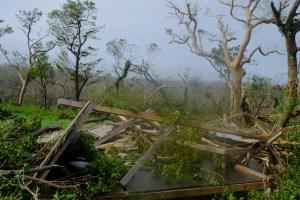
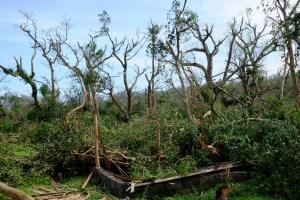
I stood on the roof, breathing deeply after my work, and looked out over the college: three dormitory buildings, a kitchen, a permanent double-classroom, the principal’s house and our own family home which we had had built two years ago and have been working on ever since. All of which, as well as the students themselves, I had taken responsibility for a couple of days before.
Being a small college it’s normally just me lecturing alongside the principal. However, since the college had just found itself without a principal, I had volunteered to take over the administration until the new principal, a Tannese man, arrived at the end of the year. That was just before the first cyclone warning intruded into our lives.
At 7:48am on the morning that Robert and I checked the roofs, I had discovered that we had been on a yellow alert since 6:00pm the night before. I gathered the students together and read from Job 38, prayed for our safety, sent some students home, and gave instructions to the remaining two as to how we would make our college ready.
Irene busied herself with moving things from the dorms to the stronger classrooms and Robert and I worked our way around the college grounds.
At home I began to put up the cyclone shutters and we did what we could to make things secure, moving anything that could be caught by the wind, choosing the most strategic place to park the hilux, and getting ready to shelter inside the house without water, electricity or a bathroom.
By night time we were placed under a red alert, but we were already satisfied that we were ready. The two students were joined by other members of the community and would sleep in the strong double classroom built by Presbyterian Church of Australia work parties. Margaret and I brought the last things in and put up the remaining cyclone shutters before heading to bed. There was nothing more to do.
By the next morning it would have been too late to do any more. At first light we were just able to open the doors and cross the verandah to go to the bathroom, but by the end of breakfast, the wind had shifted and heightened in such a way that we could only shelter inside.
With the shutters closed, it was dark in the house and we just had to wait by torchlight and listen to the wind and the sound of tree branches and parts of other buildings hitting the house.
Margaret likened the experience to being in a house while it was being beaten up. And really, that was what was happening. The iron on one side of the house ripped up to let daylight and sheets of rain into our house. All we could do was to sit and watch and, when it seemed to be between the bigger gusts, move around the house to rescue the more important things from the worst of the flooding.
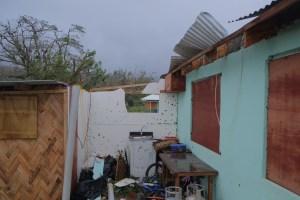
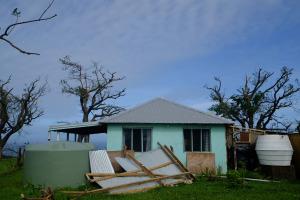
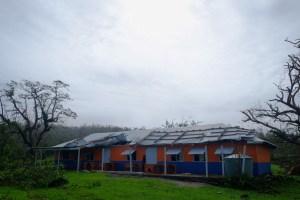
The trees, most of which were mangoes and previously gave the college a park-like feel, had lost almost all their leaves and their branches covered the ground.
The people who were sheltering in the classroom, lost their houses. Their gardens were partly destroyed, leaving some of their crops to rot in the ground. The college gardens were in a similar state. When I asked an old chief if he had ever seen a cyclone like that, he said never in all his life.
Immediately after the cyclone, there was plenty of food around. Fish and crabs were washed ashore. Birds, weakened by the wind, were easy prey. Likewise plenty of flying foxes, who lost their habitat, were shot down by kids with slingshots. Some cattle were killed by falling branches and needed to be eaten. We even had meat that needed to be eaten because it had thawed due to loss of electricity.
But our garden was destroyed and we could see that with every tree knocked flat, it would be some time before there would be any fresh fruit and vegetables available on Tanna. Margaret’s first job was to dry out and clean up our mess of a house created by the rain, leaves and other debris which had come inside, but she soon turned to planting a garden. What used to be our hobby had become our livelihood.
After I had visited our neighbours and friends, my job was to reconnect the water and electricity and to repair our roof before it rained again.
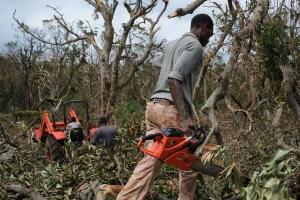
In time, help arrived for the locals. We saw more and more planes overhead, two of which flew over us and dipped their wings to wave. Then came the helicopters and naval ships. The road was cleared. The Australian Army, French Army, Red Cross, World Vision, Samaritan’s Purse and others came and helped, providing tarpaulins and food for the people and helping to recover water supply.
What’s the big picture for our ministry?
The morning after the cyclone, I sent the last two students home. Given the extent of the damage, they needed to check on their families and their families needed to see that they were alright. I told them not to hurry back, but rather to help their families rebuild. The college wasn’t operational. The classroom could be made functional easily enough, but without dorms and a kitchen, we couldn’t house the students. Besides which, given that our community had lost their houses, we needed the classrooms to house the homeless.
A month later, the college hasn’t reopened, but I hope that it will within a fortnight. Several students have come back keen to get started; one was here two days after the cyclone. So we are encouraged and want to get underway as soon as possible.
As yet, we haven’t been able to build anything. Good help has been hard to find. It is good and right that people rebuilt their own houses first to give shelter to their families. But now that that has mostly happened, and my hope is that next week, people from a local church will come and build a temporary dorm with the materials from the fallen-down buildings.
My plan is to make the college manageable my holding back the first year students until next year. The lower student numbers would then mean that I could finish the second year’s studies with minimal infrastructure. With just the second years, we can use one classroom for a girl’s dorm and have lessons in the other. That just leaves as small boys’ dorm and a kitchen to be built.
That takes care of the immediate needs. However the classroom really needs to be repaired before the next cyclone reaches us, there is no house for the new principal next year, and we won’t be fully operational until we rebuild at least one more dormitory for female students.
By God’s grace and your generosity we already have much of the funding for this work. Before Margaret and I had even been able to make contact with the outside world, a fund had been set up to help us and our work and we are deeply thankful for it. We have also been told that a similar fund had been set up by Grace Presbyterian in NZ. The Presbyterian Church of Australia have indicated that they would like to fund the rebuilding of the classroom.
What would be wonderful this year would be the help of builders and willing helpers. Grace Presbyterian Church had already planned to send a work party this year. Perhaps we could also host one or more teams from WPC. Contact us at [email protected] if you are interested.
What’s the big picture for us?
We are very thankful to God for our lives and our continued ministry here. Beyond those things, it’s great that our house is standing and our vehicle’s intact. The money to replace the things we had lost was already raised before we even knew about it. So we are overwhelmingly grateful for what we have.
We are also encouraged in our ministry here: in rebuilding, we have an opportunity to actually improve the college grounds; we look forward to working with a small but divers group of second year students; and we have also found that the cyclone has allowed us to serve our community, strengthen bonds with people, and we were excited to see at Easter that we had a full house on Sunday morning.
We do however realized that it will be a big year. It was always going to be a big year. With no principal and having most of the teaching load I would have been busy enough. On top of that I need to do the paperwork necessary to register the college with the government, or we could face being shut down next year. Now there is rebuilding to add into the mix.
We could really use a little practical help from a builder to help us get back on out feet. It would mean that I could focus on teaching and managing the college and mission fields. If you have the skills, the time, and don’t mind staying in a tent, we would make you most welcome. Just let us know.
We would like to thank you all for your support. We have felt really loved by hearing of everyone’s concern and prayers for us. We are deeply thankful for the generous people who have given in order to meet our needs and the needs of our work, and are likewise thankful to those people who have worked administratively to collect that money. We know that we are not here alone, but have many partners with whom we work in fellowship. We give thanks to God for the work that you do because of Christ. We are working together for his kingdom here on Tanna: what a privilege!
